- Plan Your Visit
- Group Visits
- Frequently Asked Questions
- Accessibility Options
- Sweet Home Café
- Museum Store
- Museum Maps
- Search the Collection
- Initiatives
- Museum Centers
- Publications
- Digital Resource Guide
- The Searchable Museum
- Exhibitions
- Freedmen's Bureau Search Portal
- Early Childhood
- Talking About Race
- Digital Learning
- Strategic Partnerships
- Ways to Give
- Internships & Fellowships
- Today at the Museum
- Upcoming Events
- Ongoing Tours & Activities
- Past Events
- Host an Event at NMAAHC
- About the Museum
- The Building
- Meet Our Curators
- Founding Donors
- Corporate Leadership Councils
- NMAAHC Annual Reports

The Revolutionary Practice of Black Feminisms
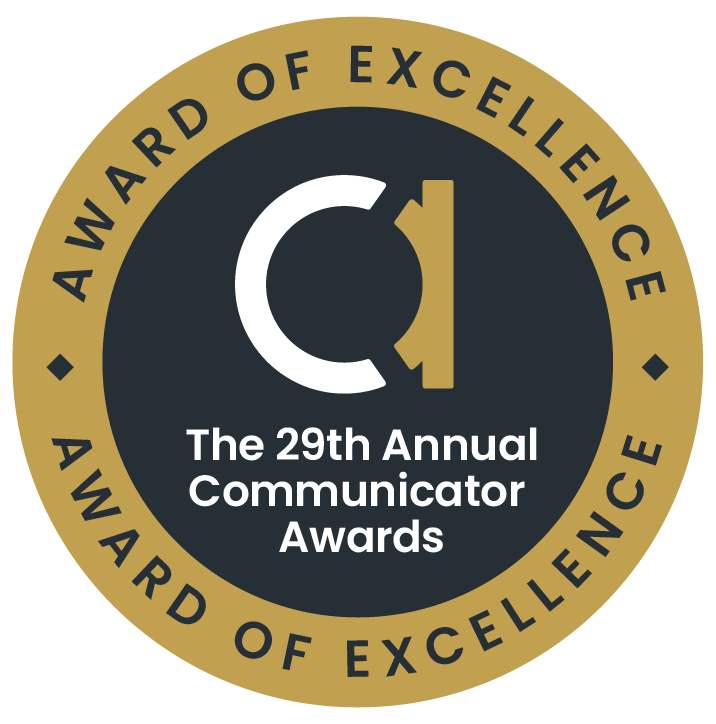
The black feminist tradition grows not out of other movements, but out of the condition of being both black and a woman. It is a long tradition which resists easy definition and is characterized by its multi-dimensional approach to liberation.
In 1864, Sojourner Truth sold cartes-de-visite, small photographs mounted to a paper card, to support her activism. Featuring the slogan “I sell the shadow to support the substance,” Truth capitalized on the popularity of these collector’s items to support herself and fund her speaking tours. As a formerly enslaved person, claiming ownership of her image for her own profit was revolutionary. Truth reportedly said that she “used to be sold for other people’s benefit, but now she sold herself for her own.” Though expressions of black feminism can be seen in written accounts as far back as the 1830s, Sojourner Truth is the most widely known nineteenth-century black feminist foremother. Throughout her life, Truth linked the movement to abolish slavery and the movement to secure women’s rights, stating that for black women, race and gender could not be separated.

Left to right: carte-de-visite portrait of Sojourner Truth, 1864; carte-de-visite portrait of Sojourner Truth, 1863; cabinet card of Sojourner Truth, 1864
Truth’s speeches and activism represent an early expression of the black feminist tradition. Black feminism is an intellectual, artistic, philosophical, and activist practice grounded in black women’s lived experiences. Its scope is broad, making it difficult to define. In fact, the diversity of opinion among black feminists makes it more accurate to think of black feminisms in the plural. In an oral history interview from the Museum’s collection, noted activist and scholar Angela Davis speaks to this point:
I rarely talk about feminism in the singular. I talk about feminisms. And, even when I myself refused to identify with feminism, I realized that it was a certain kind of feminism . . . It was a feminism of those women who weren’t really concerned with equality for all women... Dr. Angela Davis August 5th, 2019, Oral History Interview, National Museum of African American History and Culture
Despite different visions, a few foundational principles do exist among black feminisms:
- Black women’s experience of racism, sexism, and classism are inseparable.
- Their needs and worldviews are distinct from those of black men and white women.
- There is no contradiction between the struggle against racism, sexism, and all other-isms. All must be addressed simultaneously.

Pin for the National Association of Colored Women's Clubs owned by Mary Church Terrell, 20th century.
A2017.13.1.45
“Lifting as we climb,” the slogan of the National Association of Colored Women (NACW), became a well-known motto for black women’s activism in the late nineteenth century. By this time, middle class black women organized social and political reform through women’s organizations, or clubs. Having had more resources and access to education than a woman like Sojourner Truth, these women’s experiences led them to a different expression of black feminism. Their project of racial uplift focused on combating harmful stereotypes surrounding black women’s sexuality and gender identity.
Problematically, they emphasized elevating poor women, less out of a sense of good-will, than out of a recognition that black women of any class would be judged through the circumstances of those “with the fewest resources and the least opportunity.” In discussing the motto of the NACW, Mary Church Terrell, founding president of the organization, said, “Even though we wish to shun them…we cannot escape the consequences of their acts… Self-preservation would demand that we go among the lowly… to whom we are bound by ties of race and sex.”

Service Award pin for Mary Church Terrell from the NACW, 1900.

Photograph of Mary Church Terrell by Addison Scurlock, ca. 1910.

Plaque for National Association of Colored Women service award, 1949.
Gallery Modal
The black feminism of the club movement is often overlooked, but as black feminist theorist Brittney Cooper points out, clubs such as the NACW can be seen as sites of development for black feminist leadership and thought despite their elitism. The club movement ushered in a new era of intellectual, artistic, and philosophical production by black women about their own experiences.

Placard with "STOP RACISM NOW" message, late 20th century. Commissioned by the National Organization for Women.
Pauli Murray , an activist, writer, Episcopal priest, and legal scholar, played an important role in several civil, social, and legal organizations including the National Organization of Women (NOW), which she cofounded in 1966. Throughout her life, Murray had romantic relationships with women but did not consider herself a lesbian. Her biographer, Rosalind Rosenburg, suggests that had Murray been alive today, she likely would have embraced a transgender identity. Murray wrote and theorized extensively on her experiences of black womanhood asserting that, for her, gender, race, and sexuality could not be separated. This refusal to separate her identity fueled her legal work and activism. In the NOW placard above from shortly after the group’s founding, the political connections between the women’s movement and anti-racist activity can be seen. However, Murray would soon become disillusioned with NOW as she saw the organization distance itself from economic and racial justice.

Rev. Dr. Pauli Murray in her study in Arlington, Virginia, December 1976.

Members of the National Council of Negro Women including Dorothy Height and Pauli Murray (both seated), 1976.

Rev. Dr. Pauli Murray being ordained at the National Cathedral, January 1977.
As the only female student at Howard University Law School, Pauli Murray developed the term Jane Crow, the “twin evil of Jim Crow,” to describe the sexism black women faced. She would continue to develop theoretical, legal, and political frameworks for describing black women’s experiences. Her legal work connecting race-based and sex-based discrimination led to the inclusion of sex-based discrimination under the Equal Protection Clause. However, due to the Civil Rights Movement’s demands for “respectable” performances of black womanhood, Murray’s many contributions to civil rights history remain relatively unknown. Despite this neglect of her work, the legal and theoretical parallels she drew between racial discrimination and gender discrimination set the stage for feminist thinkers to follow.
One truth, especially within the context of black feminisms, is that queer black feminism has always been part of this. That queer black women, queer black folks have always been in these spaces. Dr. Treva Lindsey 2019 NMAAHC public program "Is Womanist to Feminists as Purple is to Lavender?: African American Women Writers and Scholars Discuss Feminism"
The 1970s marked an increase in explicitly black feminist organizing, due in part to tensions inflamed during the Women’s Liberation and Civil Rights Movements. By this time, queer black feminists were becoming more openly and visibly positioned within black feminist groups. They also began creating their own organizations—such as the Salsa Soul Sisters , one of the first out and explicitly multi-cultural lesbian organizations —due to tensions with straight black feminists as well as white gays and lesbians. The influential Combahee River Collective statement , co-authored by Barbara Smith, expressed a radical, queer black feminist platform still relevant to expressions of black feminism today.

Barbara Smith at a National Gay Rights March, 1993.

Marchers with "Salsa Soul Sisters" banners, 1983.

Sister Outsider: Essays and Speeches by Audre Lorde, 1984.
In 1983, Alice Walker developed the term “womanist” to describe “a Black feminist or feminist of color.” Her term defined a more communal and humanist expression of feminism that acknowledged queer black women and aligned with long-standing traditions of black women’s thought and activism. Sister Outsider , by Audre Lorde, is one of many foundational womanist writings produced during this period. In her essays and speeches, Lorde discusses the connected issues of sexism, racism, classism, and heterosexism, while calling for new tactics that centered these intersections.
Black women are often thought to be at a disadvantage because of racism and sexism, but some black feminists view their position as one of possibility. They argue that in the struggle for freedom, the people most exposed to different forms of oppression understand best how to dismantle them. While late nineteenth century black feminisms were grounded in heterosexual black women’s bodies, by the end of the twentieth and into the twenty-first century, radical black feminisms came to center queer and trans black women, girls, and gender nonconforming people.

Untitled , 2015. Photograph by Sheila Pree Bright taken at a Black Lives Matter rally in Atlanta, Georgia.
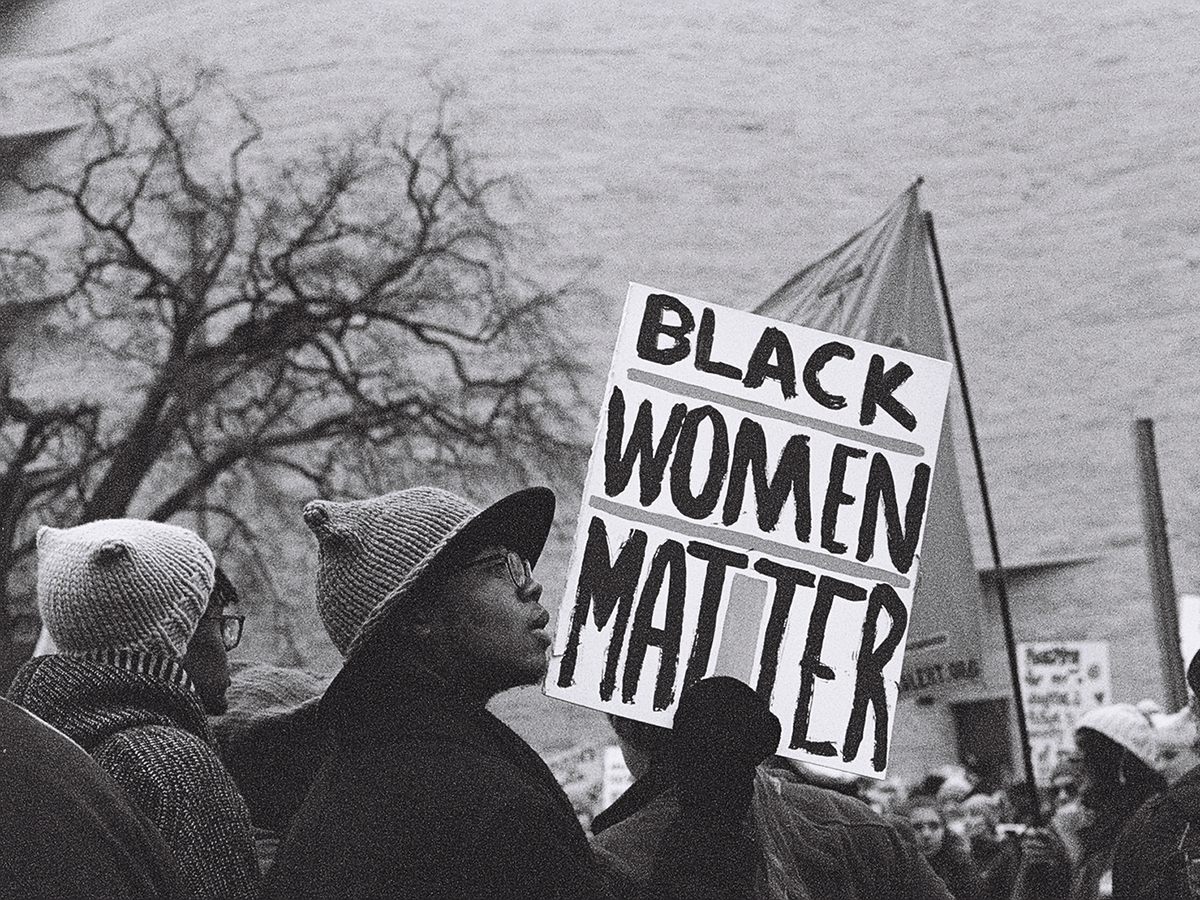
Marchers at the Women’s March, January 21, 2017.

Untitled , August 25, 2015.
Outside black feminist circles, black feminisms are often described as an outgrowth of other freedom struggles. While black women’s experiences working within political and social movements of the nineteenth and twentieth centuries certainly informed articulations of black feminism, black feminisms have never been derivative, nor do they fit cleanly into the “waves” of feminist history . For black women and other women of color, race and gender are inseparable, and black feminists resist all movements that ignore this reality. From women’s suffrage to the Women’s March of 2017, they have been unwilling to compromise on the assertion that a feminism which does not incorporate different experiences of womanhood cannot achieve full liberation. Since before Sojourner Truth sold her “shadow,” women in the black feminist tradition have developed theoretical frameworks and practices born of their experiences, to get, as black feminist scholar Dr. Treva Lindsey put it, “freer and freer and freer.”
Browse Objects Relating to Feminism in the NMAAHC Collection
Written by Max Peterson, Fall 2019 Intern Published on March 4, 2019
Is Womanist to Feminist as Purple is to Lavender?: African American Women Writers and Scholars Discuss Feminism program - https://www.ustream.tv/recorded/124469629
Guy-Sheftall, Beverley, ed. Words of Fire: An Anthology of African American Feminist Thought. New York, NY: The New Press, 1995.
Cooper, Brittney C. Beyond Respectability: The Intellectual Thought of Race Women. Urbana, IL: University of Illinois Press, 2017.
Springer, Kimberly. Living for the Revolution: Black Feminist Organizations, 1968-1980. Durham, NC: Duke University Press, 2005.
Lorde, Audre. Sister Outsider: Essays and Speeches. Freedom, CA: Crossing Press, 1984.
Walker, Alice. In Search of Our Mother’s Gardens: Womanist Prose . San Diego, CA: Harcourt Brace Jovanovich, 1983.
- Craft and Criticism
- Fiction and Poetry
- News and Culture
- Lit Hub Radio
- Reading Lists

- Literary Criticism
- Craft and Advice
- In Conversation
- On Translation
- Short Story
- From the Novel
- Bookstores and Libraries
- Film and TV
- Art and Photography
- Freeman’s
- The Virtual Book Channel
- The Lit Hub Podcast
- The Critic and Her Publics
- Fiction/Non/Fiction
- I’m a Writer But
- Windham-Campbell Prizes Podcast
- Write-minded
- First Draft: A Dialogue on Writing
- Behind the Mic
- Lit Century
- Tor Presents: Voyage Into Genre
- Beyond the Page
- The Cosmic Library
- Emergence Magazine
- The Best of the Decade
- Best Reviewed Books
- BookMarks Daily Giveaway
- The Daily Thrill
- CrimeReads Daily Giveaway

The Foundations of Black Feminism and Womanism: A Reading List
Negesti kaudo lists some pillars of womanist writing.
What does it mean to be Black, American, and a woman? While trying to answer this question, I searched retroactively, exploring the writing of womanists and Black feminists before me. The authors included on this list have lived and survived a different era of the United States of America and its tumultuous relationship with Black women. Womanism is a form of feminism that focuses on achieving equity as a community, specifically for Black women, men, and children, in contrast to feminism, which ebbs and flows to and from its original intent over the years.
The original definition of womanism is much longer and describes different versions of what a womanist can look like, which, in many ways, each of these books expands upon. This list is not definitive, and certainly not exhaustive, but the works of the following writers have helped me understand womanism, Black feminism, and my role as a Black woman artist in the movement, both now and in the future.
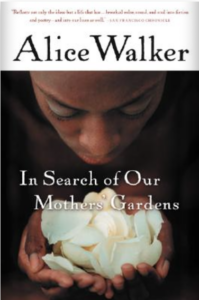
Alice Walker, In Search of Our Mothers’ Gardens: Womanist Prose (Amistad Press)
The collection includes a selection of works from 1966–1982, in which Walker writes about everything from Black art and creativity and the civil rights movement to female artists like Zora Neale Hurston and Georgia O’ Keefe. Amongst these works is Walker’s 1981 essay “Gifts of Power,” which focuses on the origins of the Shaker community in upstate New York during the late 1800s, whom she describes as womanists. Her argument is that because the Shakers were women who had left their husbands to live and commune together (chastely of course, due to celibacy) many would label them “lesbians,” but their relationship as a community of women that existed independently was something more… And to Walker, that meant they fit into a category of womanist.
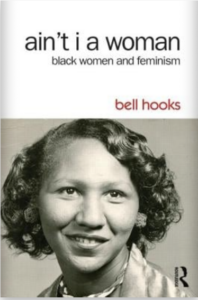
bell hooks, Ain’t I a Woman: Black Women and Feminism (Routledge)
bell hooks explores the history of feminism and its impact on Black women by analyzing the ways the feminist movement has consistently excluded us in order to achieve progress. But the movement’s idea of “progress” aims for women to reach equality with white men, rather than equity for Black women and black men (as well as white women). I think about this book every day since I read it. Ain’t I a Woman asks the reader to be critical of the motives behind feminism and the spaces created to serve it and teaches us if that space doesn’t serve us, how to create out own.
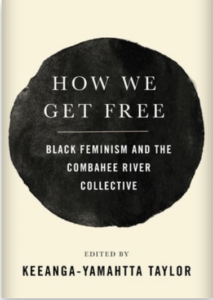
Ed. by Keeanga-Yamahtta Taylor, How We Get Free: Black Feminism and the Combahee River Collective (Haymarket Books)
If you consider yourself a womanist or a Black feminist, then this book should be on your list. How We Get Free is a timely reminder of the ways that Black women have helped organize and lead the charge for antiracism and women’s liberation. In a collection of interviews between Keeanga-Yamahtta Taylor and the founding members of The Combahee River Collective—a group of radical Black feminists who have been organizing since 1974—this book compares contemporary activism to that of our foremothers, exploring the legacy of Black feminism and its impact today.
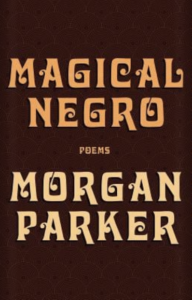
Morgan Parker, Magical Negro (Tin House Books)
This startling book of poems is a stark follow-up to Morgan Parker’s witty debut, There Are Things More Beautiful Than Beyoncé . At the 2019 AWP conference in Portland, Parker said she felt the ancestors’ presence with her as she wrote the poems in Magical Negro . The collection explores the characters of different “magical negroes” in pop culture, daily microaggressions (be they from dating a “Matt” or running into white women at the braid shop), and, in general, what it’s like to live as a Black woman in 21st-century America.
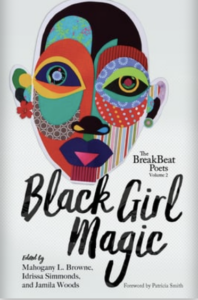
Ed. by Idrissa Simmonds, Jamila Woods, and Mahogany L. Browne, Black Girl Magic: The Breakbeat Poets Volume 2 (Haymarket Books)
Following The BreakBeat Poets Volume 1 , the editors of Volume 2 have selected a collection of poems that assert the space that Black women hold in the hip-hop world and offer various lyrical perspectives of Blackness and womanhood in America today from more than 60 writers. Insightful, inspiring, relatable, and sometimes even heartbreaking, Black Girl Magic encompasses the wealth, beauty, and range of Black women.
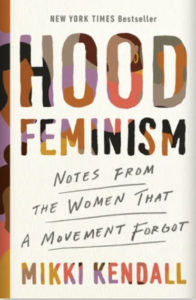
Mikki Kendall, Hood Feminism: Notes from the Women That a Movement Forgot (Viking)
Mikki Kendall’s collection of essays Hood Feminism focuses on contemporary feminism and explores the way it fails to be inclusive for all women; instead, it is positioned to support a select few. Kendall uses her own experiences to breakdown the feminist movement in a bold, but necessary, follow-up to the bell hooks’ criticism of the feminist movement in Ain’t I A Woman .
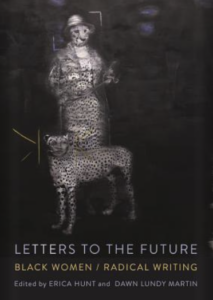
Ed. by Erica Hunt and Dawn Lundy Martin, Letters to the Future: Black Women/Radical Writing (Kore Press)
As an essayist, I love anthologies, where I can find a lot of different perspectives and voices all in one place. Inspired by Octavia Butler, editors Erica Hunt and Dawn Lundy Martin asked writers to respond to the following prompt: “In the radical sum of the thinking in your work, you encourage the reader to look where no one else is looking, to tune into registers that provide critical cues for the future.” The work in this collection of radical Black women writers bends the rules of genre and explores matters of intersectionality without confining itself to the language or ideas of writing that have been made “tradition” or “canon” by popularized white writers in the past. The pieces in this collection stray away from how writers and artists are taught to understand genre and form, with each writer molding their craft to create a space in the canon carved from their own image.
__________________________________
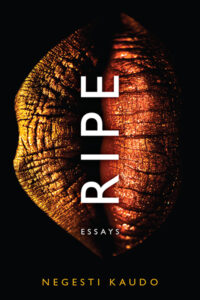
Ripe: Essays by Negesti Kaudo is available via Mad Creek Books.
- Share on Facebook (Opens in new window)
- Click to share on Twitter (Opens in new window)
- Click to share on Google+ (Opens in new window)
- Click to share on LinkedIn (Opens in new window)
- Click to share on Reddit (Opens in new window)
- Click to share on Tumblr (Opens in new window)
- Click to share on Pinterest (Opens in new window)
- Click to share on Pocket (Opens in new window)
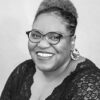
Negesti Kaudo
Previous article, next article, support lit hub..

Join our community of readers.
to the Lithub Daily
Popular posts.

Taking the “Ick” Out of “Sick Lit.” A Reading List
- RSS - Posts
Literary Hub
Created by Grove Atlantic and Electric Literature
Sign Up For Our Newsletters
How to Pitch Lit Hub
Advertisers: Contact Us
Privacy Policy
Support Lit Hub - Become A Member
Become a Lit Hub Supporting Member : Because Books Matter
For the past decade, Literary Hub has brought you the best of the book world for free—no paywall. But our future relies on you. In return for a donation, you’ll get an ad-free reading experience , exclusive editors’ picks, book giveaways, and our coveted Joan Didion Lit Hub tote bag . Most importantly, you’ll keep independent book coverage alive and thriving on the internet.

Become a member for as low as $5/month

SHARE ARTICLE
Left to read, published on.
March 24, 2022
ARTICLE LENGTH
15 Minute Read
30 Books Written by Black Womanists and Feminists

Growing up, I struggled with connecting to feminism. We didn’t discuss it in my neighborhood, an urban area, only 7 square miles long. Or with the women I knew, who were working-class and struggling to make ends meet. Too busy to focus on trivial terms. Then came the feminist movements.
I never wore a Pink Pussyhat to a rally to support women’s rights; it didn’t feel right. I purchased the “Lean In” book by Facebook COO Sheryl Sandberg, once lauded as the feminist manifesto to getting ahead in the workplace, but I never finished it. The late author and acclaimed intersectional feminist, bell hooks, called Sandberg’s position “faux feminist” and described her stance on gender equality in the workplace as agreeable to those who wield power in society — wealthy white men. Our beloved former first lady Michelle Obama once declared in front of an audience, “And it’s not always enough to lean in because that shit doesn’t work all the time.” I knew then why that book wasn’t quite the page-turner I had hoped it would be.
Ahh, who could forget the “girlboss” movement? I can’t lie. This one got me. The hustle culture became synonymous with success, something I craved. But, it became more of a hashtag than something that invoked positive change in my life.
By definition, feminism is the belief in full social, economic, and political equality for women. So, yes, by definition, I am a feminist. However, the feminist movement of yesteryear’s mostly focused on high-achieving white women, which excluded many lower-income women, women of color, and single mothers. At one point, I checked each of those boxes. As a Black working mom to a young daughter, I needed to find something better aligned with my ideals.
Womanism is a form of feminism focused on the conditions and concerns of Black women. Clenora Hudson-Weems, author and Professor of English at the University of Missouri, identified further differences between womanism and feminism being womanism is “family-oriented” and focuses on race, class, and gender, while feminism is “female-oriented” and strictly focuses on biological sex-related issues women and girls face, globally.
I choose the latter.
As I continue to learn more about myself and exist in this world, I’m choosing to fill my cup with books that expand my knowledge as a Black woman having a human experience.
Here are 30 books written by Black womanists and feminists to help you do the same.
Non-Fiction

Presenting the essential writings of black lesbian poet and feminist writer Audre Lorde, “ Sister Outsider” celebrates an influential voice in 20th-Century literature.
- “Black Feminist Thought” by Patricia Hill Collins
Patricia Hill Collins set out to explore the words and ideas of Black feminist intellectuals and writers.
- “Thick” by Tressie McMillan Cottom
In eight highly praised treatises on beauty, media, money, and more, Tressie McMillan Cottom ― award-winning professor ― is unapologetically “thick.”

Originally released in 1981, “ This Bridge Called My Back” is a testimony to women of color feminism as it emerged in the last quarter of the twentieth century. Through personal essays, criticism, interviews, testimonials, poetry, and visual art, the collection explores, as co-editor Cherríe Moraga writes, “the complex confluence of identities — race, class, gender, and sexuality — systemic to women of color oppression and liberation.”
- “In Search of Our Mother’s Gardens” by Alice Walker
Alice Walker’s first collection of non-fiction, where she speaks out as a black woman, writer, mother, and feminist. Among the 36 pieces are essays about other writers, accounts of the civil rights movement of the 1960s and the anti-nuclear movement of the 1980s, and a vivid memoir of a scarring childhood injury and her daughter’s healing words.
- “All About Love” by Bell Hooks
“All About Love” reveals what causes a polarized society, and how to heal the divisions that cause suffering. Here is the truth about love, and inspiration to help us instill caring, compassion, and strength in our homes, schools, and workplaces.

Award-winning journalist Joan Morgan bravely probes the complex issues facing African-American women in today’s world: a world where feminists often have not-so-clandestine affairs with the most sexist of men; where women who treasure their independence often prefer men who pick up the tab; and where the deluge of baby mothers and baby fathers reminds black women who long for marriage that traditional nuclear families are a reality for less than 40% of the African-American population.
- “Assata” by Assata Shakur
Assata Shakur recounts the experiences that led her to a life of activism and portrays the strengths, weaknesses, and eventual demise of Black and White revolutionary groups at the hand of government officials.
- “Women, Race & Class” by Angela Davis
Angela Davis provides a powerful history of the social and political influence of whiteness and elitism in feminism, from abolitionist days to the present, and demonstrates how the racist and classist biases of its leaders inevitably hampered any collective ambitions.

In her profound and courageous New York Times bestseller, Janet Mock establishes herself as a resounding and inspirational voice for the transgender community — and anyone fighting to define themselves on their own terms.
- “Killing the Black Body” by Dorothy Roberts
In 1997, this groundbreaking book made a powerful entrance into the national conversation on race. In a media landscape dominated by racially biased images of welfare queens and crack babies, “ Killing the Black Body” exposed America’s systemic abuse of Black women’s bodies.
- “Emergent Strategies” by Adrienne Marie Brown
Inspired by Octavia Butler’s explorations of our human relationship to change, “ Emergent Strategy” is radical self-help, society-help, and planet-help designed to shape the futures we want to live.

In “ Black on Both Sides ,” C. Riley Snorton identifies multiple intersections between Blackness and trans-ness from the mid-19th Century to present-day anti-Black and anti-trans legislation and violence.
- “Left of Karl Marx” by Carole Boyce Davies
In “ Left of Karl Marx ,” Carole Boyce Davies assesses the activism, writing, and legacy of Claudia Jones (1915–1964), a pioneering Afro-Caribbean radical intellectual, dedicated communist, and feminist.
- “Sister Citizen” by Melissa Harris-Perry
From a highly respected thinker on race, gender, and American politics, a new consideration of black women and how distorted stereotypes affect their political beliefs

“Zami” started a new genre that the author calls “biomythography,” which combines history, biography, and myth. This book is known for its explicit and evocative imagery and treatment of the mother-daughter relationship.
- “ Here Comes the Sun “ by Nicole Dennis-Benn
A New York Times Notable Book of the Year and Winner of the LAMBDA Literary Award for Lesbian Fiction showcases a cast of unforgettable women battling for independence while a maelstrom of change threatens their Jamaican village.
- “ A Raisin in the Sun “ by Lorraine Hansberry
Lorraine Hansberry’s award-winning drama about the hopes and aspirations of a struggling, working-class family living on the South Side of Chicago connected profoundly with the psyche of black America — and changed American theater forever. The play’s title comes from a line in Langston Hughes’s poem “Harlem,” which warns that a dream deferred might “dry up/like a raisin in the sun.”

This acclaimed post-apocalyptic novel of hope and terror tackles global climate change and economic crises, which led to social chaos in the early 2020s.
- “The Color Purple” by Alice Walker
Celie is a poor black woman whose letters tell the story of 20 years of her life, beginning at age 14 when she is being abused and raped by her father and attempting to protect her sister from the same fate, and continuing over the course of her marriage to “Mister,” a brutal man who terrorizes her. Celie eventually learns that her abusive husband has been keeping her sister’s letters from her and the rage she feels, combined with an example of love and independence provided by her close friend Shug, pushes her finally toward an awakening of her creative and loving self.
- “The Bluest Eye” by Toni Morrison
In Morrison’s acclaimed first novel, Pecola Breedlove — an 11-year-old Black girl in an America whose love for its blond, blue-eyed children can devastate all others—prays for her eyes to turn blue: so that she will be beautiful so that people will look at her, so that her world will be different. This is the story of the nightmare at the heart of her yearning and the tragedy of its fulfillment.

A community of Black faith healers witness an event that will change their lives forever in this “hard-nosed, wise, funny” novel ( Los Angeles Times ).
- “Their Eyes Were Watching God” by Zora Neale Hurston
“Their Eyes Were Watching God” brings to life a Southern love story with the wit and pathos found only in the writing of Zora Neale Hurston.
- “Children of Blood and Bone” by Tomi Adeyemi
Tomi Adeyemi’s West African-inspired fantasy debut conjures a world of magic and danger.

Walidah Imarisha and Adrienne Maree Brown have brought 20 of them together in the first anthology of short stories to explore the connections between radical speculative fiction and movements for social change. These visionary tales span genres — sci-fi, fantasy, horror, magical realism — but all are united by an attempt to inject a healthy dose of imagination and innovation into our political practice and to try on new ways of understanding ourselves, the world around us, and all the selves and worlds that could be.
- “The Fifth Season” by N.K Jemison
At the end of the world, a woman must hide her secret power and find her kidnapped daughter.
- “Homegoing” by Yaa Gyasi
Yaa Gyasi’s extraordinary novel illuminates slavery’s troubled legacy both for those who were taken and those who stayed—and shows how the memory of captivity has been inscribed on the soul of our nation.

“Bridget Jones’s Diary” meets “ Americanah” in this disarmingly honest, boldly political, and truly inclusive novel that will speak to anyone who has gone looking for love and found something very different in its place.
- “Things Fall Apart” by Chinua Achebe
Things Fall Apart is the first of three novels in Chinua Achebe’s critically acclaimed African Trilogy. It is a classic narrative about Africa’s cataclysmic encounter with Europe as it establishes a colonial presence on the continent.
- “The Twelve Tribes of Hattie” by Ayana Mathis
In 1923, 15-year-old Hattie Shepherd, swept up by the tides of the Great Migration, flees Georgia and heads north. Full of hope, she settles in Philadelphia to build a better life. Instead, she marries a man who will bring her nothing but disappointment. This book tells the story of a mother’s monumental courage — and a nation’s tumultuous journey.
JOIN THE CONVERSATION

How to Meet the Parents During the Holiday Season

Top Black Running Clubs to Join

Grace Byers Talks New Motherhood, Holiday Traditions and ‘Harlem’ Season 3
More related.

Creating Holiday Traditions That Fit Your Life

Thanksgiving Groove: Top 17 Songs to Play This Holiday

Finding Black Joy at Disneyland’s Tiana’s Bayou Adventure

How One Entrepreneur Turned a PCOS Diagnosis Into a Thriving Business For Women

Black Love Holiday Gift Guide 2024: Perfect Gifts for Every Loved One on Your List

10 Black-Owned Bookstores to Visit
We use cookies to improve your experience. By your continued use of this site you accept such use. For more information see our policy . ACCEPT

10 Memoirs and Essay Collections by Black Women

Reading Lists
These contemporary books illuminate the realities of the world for black women in america.

Electric Literature Urgently Needs Your Help
For the 15,000 people who visit our site every day, reading Electric Literature costs nothing. And yet Electric Lit is not free. We need to raise $25,000 by December 31, 2024 to keep Electric Literature going into next year. If the continued existence of Electric Literature means something to you, please make a contribution today .

In her 1993 poem, “won’t you celebrate with me,” author and educator, Lucille Clifton, invites us to wonder at the life she has created:
“… i had no model born in babylon both nonwhite and woman what did i see to be except myself? i made it up.”
As a Black woman existing at the intersections of these marginalized identities (“both nonwhite and woman”), Clifton finds herself rendered invisible in the mainstream and—consequently—creates herself in the process. 30 years onwards, Black women writers continue to take on the mantle of rendering themselves visible across genres and constructing models for future generations to see themselves in.
This has been especially true in the case of personal narratives, from memoir to essay collections. Starting with Harriet Jacobs’ Incidents in the Life of a Slave Girl published in 1861 as a foundational abolitionist text, through to Angela Davis: An Autobiography released only a few years after the acquittal of the Black Panther leader and prominent feminist, Black women have narrated their stories and transformed the personal into the political with radical results.
In our own personal narratives, we shrug off duty and expectations, the needs of others become secondary to our primary, as we catalog our hurts and our hopes. We become the hero, not saving anyone else but ourselves. To borrow a phrase from the late bell hooks, we move from the margin to the center.
The following contemporary memoirs and personal essay collections released in the past ten years exemplify this growing urgency by Black women to tell our side of the story. Their words illuminate the realities of the world and the impact of racist and sexist systems of powers on the lives of the most disenfranchised. These works are affecting, funny, haunting, inspiring and all urgently salient. They are additions to the records and the archives, insisting and reminding us that our voices always matter.
Men We Reaped: A Memoir by Jesmyn Ward
Within a four-year time span, two-time National Book Award winner Jesmyn Ward saw the deaths of five Black men in her life, including that of her brother. She chronicles their lives, alongside her own, of growing up in Mississippi and the history of racial violence that surrounds around them. “Hopefully, I’ll understand why my brother died while I live,” Ward writes, ”and why I’ve been saddled with this rotten fucking story.” Her journey of reflection is one of grief, anger, and guilt, all buoyed ultimately by the love that comes through of her family and the home that raised her.

Negroland: A Memoir by Margo Jefferson
Writing about her upbringing in a wealthy, professional Black community of Chicago in the 1950s, critic Margo Jefferson reflects on the intersections of race, gender, class, and color within her community, poetically delving into the nuances of Black life. The Pulitzer Prize winner manages a tight balancing act, honestly approaching the privileges and prejudices of her childhood family and friends, whilst remaining steadfast in her knowledge and understanding that Blackness—regardless of status or hue—is still ultimately Black. “We’re considered upper-class Negroes and upper-middle-class Americans,” her mother tells her, “But most people would like to consider us Just More Negroes.”
We Are Never Meeting In Real Life: Essays by Samantha Irby
Though comedy writing—much like comedy itself—continues to be a boy’s club, Samantha Irby fuses sarcasm, self-deprecation, and toilet humor into musings and anecdotes about her life in the Midwest. Whether she is writing about The Bachelorette or mental health or falling in love, her singular voice is sure to bring you to tears of laughter or sadness, if not both at the same time. In an especially funny take on her pain she asks, “Do Black girls even get to be depressed?” and hordes of us nod in synchronized recognition.
Hunger: A Memoir of (My) Body by Roxane Gay
Author, cultural critic, and professor Roxane Gay has never shied away from the story of the violent sexual assault that took place as a child, but the story extends from that experience to explore additional themes around the (her) body. Using examples from her own lived experiences, she challenges assumptions and conventional thinking about health and wellness, taking to task all the unacknowledged fatphobia we pervasively encourage in our society. Gay’s memoir is sometimes difficult to read, but necessarily so, particularly the parts where she works through her own demons and leaves us no choice but to confront ours too. “I buried the girl I had been… and perhaps I am writing my way back to her, trying to tell her everything she needs to hear.”
Thick: And Other Essays by Tressie McMillan Cottom
In a series of wide-ranging essays, the university professor and MacArthur Genius covers beauty standards, Black maternal mortality, and the election of Barack Obama, told through personal stories, academic scholarship, and cultural criticism. Thick is intentional in centering herself and the experiences of Black women and girls—a revolutionary and counter cultural endeavor given how “[the] personal essay [has] become the way that black women writers claim legitimacy in a public discourse that defines itself, in part, by how well it excludes Black women.” McMillan Cottom refuses to be shut out.
The Yellow House: A Memoir by Sarah M. Broom
“Remembering is a chair that is hard to sit still in,” writes Sarah M. Broom in her National Book Award-winning debut work. The title comes from the name of her childhood home in New Orleans where she grew up with her large, loving, and complicated extended family. She moves away for college and continues to move further away from the yellow house, until the tragedy of Hurricane Katrina forces her to reckon with her home and all the historical and political context of where she came from. She looks at race, class, and inequality from a humanistic lens, using her story and the stories of her loved ones to reveal the harder truths about the country and how far left there is for us to go.
Memorial Drive: A Daughter’s Memoir by Natasha Tretheway
For years, former Poet Laureate and Pulitzer Prize winner ran away from the defining tragedy of her childhood—the murder of her mother by her ex-husband when Tretheway was a teenager. “All those years I thought that I had been running away from my past I had, in fact, been working my way steadily back to it,” and her memoir is her way of unpacking that journey back, beginning with her mother’s death and studying all around it. As Tretheway looks at her own life, from growing up biracial around the time of Loving v. Virginia to finding her way to becoming a writer, she is tenderly attentive to the memory of her mother and grappling with the situation of her death, taking us along the often dark journey with her.
Just Us: An American Conversation by Claudia Rankine
Much like its author, Just Us is a text that defies categorization. The poet, playwright, and essayist utilizes poems, footnotes, essays, photographs, quotes, scripts, tweets and Facebook statuses to explore and indict American racism. Rankine’s writing is grounded in her own experiences, using everything from dinner party conversations with other academics and faculty members to moments between her and her White husband in couples therapy, resulting in a text that is personal, vulnerable, and filled with beauty. Rankine asks, “How does one combat the racism of a culture?” Just Us answers.
Shine Bright: A Very Personal History of Black Women in Pop by Danyel Smith
Former editor of the iconic hip-hop and R&B publication VIBE Magazine , Danyel Smith’s memoir doubles as a music history on Black women musicians. Smith chronicles her life growing up in Oakland and her journalistic path, looking to icons like Aretha Franklin, Donna Summer and Stephanie Mills as inspiration as to who she could be, and pays them their due through her own story. “I want Black women who create music to be known and understood, as I want to be known and understood,” Danyel writes, demanding that we pay attention to them and her too.
Ordinary Notes by Christina Sharpe
Ordinary Notes can be understood best as meditations—on Blackness, on life, on the human condition—penned deftly and poignantly by the woman described in the New York Times as “shaping a generation of Black thought.” Professor Sharpe intimately walks us through her life, from the museums she walks, to the songs she listens to, to the family histories she unearths, and in the final section, she dedicates pages considering the books she describes as “giving me a place to land in difficult times.” To Sharpe, they show “Black worlds of making and possibility.” Ordinary Notes does the same.
Take a break from the news
We publish your favorite authors—even the ones you haven't read yet. Get new fiction, essays, and poetry delivered to your inbox.
YOUR INBOX IS LIT
Enjoy strange, diverting work from The Commuter on Mondays, absorbing fiction from Recommended Reading on Wednesdays, and a roundup of our best work of the week on Fridays. Personalize your subscription preferences here.
ARTICLE CONTINUES AFTER ADVERTISEMENT

Electric Lit’s Best Poetry Collections of 2023
Gabrielle Bates, Sam Sax, Sally Wen Mao, and Edgar Kunz highlight a year of celebrated poetry collections
Nov 28 - Electric Literature Read
More like this.

On The Failure Of The Frankenstein Adaptation
Modern retellings of Mary Shelley’s classic are everywhere, but most of them don’t capture the magic of the original
Aug 27 - Addie Tsai

7 Novels About Smart Immigrant Women Adrift
Sheila Sundar, author of "Habitations," recommends books about women who are trying to make sense of their adopted country and find their place in it
Apr 9 - Sheila Sundar

7 Novels that Illuminate the Dark Side of Corporate Culture
Ela Lee, author of "Jaded," recommends books about women dealing with workplace discrimination
Mar 21 - Ela Lee

DON’T MISS OUT
Sign up for our newsletter to get submission announcements and stay on top of our best work.


Racial Justice Resources for Activists, Advocates & Allies
- Black History Month
- Ableism & Disability Justice
Black feminism
- Civil Rights
- Educational Equity
- Healthcare / Health Disparities
- Higher Education
- Mental Health
- Microaggressions
- Racial Gaslighting
- Policing | Prisons
- Stereotypes
- Structural & Systemic Racism
- Voting Rights
- Anti-racism
- Critical Race Theory
- Intersectionality
- Activism
- BIPOC Resources
- Black Lives Matter
- CARA members
- Racial Healing and Authentic Allyship
- Data / Web Tools
- Facilitating conversations about race
- Local Resources (Cincinnati & Ohio)
- UC Resources
- Librarianship
How to use this guide: Black feminism
Scroll through or click on a link below to explore the topics on this page
- Black feminism: videos
- Black feminism: web resources
- Black feminism: podcasts
- Black feminism: books
“If, as Black feminists contended, oppression positioned Black women at the lowest rung on the social ladder, then eradicating their oppression would necessarily ameliorate oppression for everyone” -Robert J. Patterson
Black feminism videos
Beverly Guy-Sheftall – Say Her Name: The Urgency of Black Feminism Now Black feminist discourse and activism have been significant interventions in a variety of social justice movements in the U.S. since the 19th century, though this has not always been acknowledged. In the aftermath of reforms catalyzed by the Black Lives Matter Movement, a queer black feminist project, Guy-Sheftall’s talk will reflect upon the transformations in civil society, academe, electoral politics, the criminal justice system, and other spaces that have occurred over the past year as a result of recent protests around systemic racism and other issues.
Keeanga-Yamahtta Taylor: What We Can Learn From the Black Feminists of the Combahee River Collective We continue our interview with Keeanga-Yamahtta Taylor about the new collection of essays she edited that, titled How We Get Free: Black Feminism and the Combahee River Collective.
Black feminism: web resources
Black feminism: podcasts.
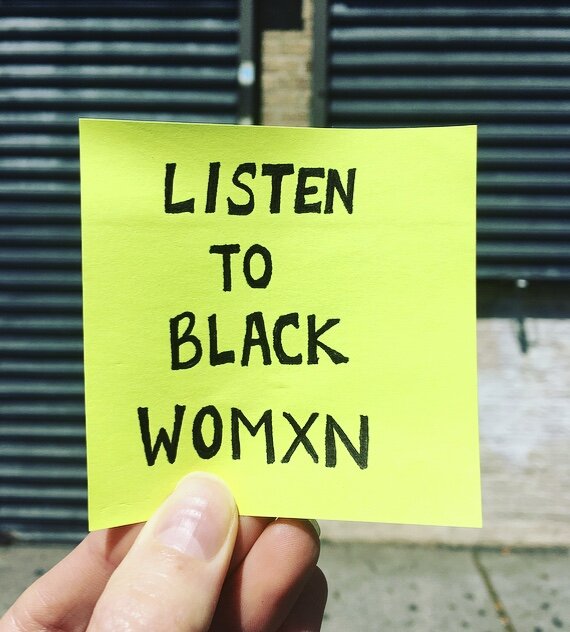
Black feminism books
- << Previous: Bias
- Next: Civil Rights >>
- Last Updated: Nov 14, 2024 2:48 PM
- URL: https://guides.libraries.uc.edu/racialjusticeresources
University of Cincinnati Libraries
PO Box 210033 Cincinnati, Ohio 45221-0033
Phone: 513-556-1424
Contact Us | Staff Directory
University of Cincinnati
Alerts | Clery and HEOA Notice | Notice of Non-Discrimination | eAccessibility Concern | Privacy Statement | Copyright Information
© 2021 University of Cincinnati

IMAGES
VIDEO
COMMENTS
Black feminism is an intellectual, artistic, philosophical, and activist practice grounded in black women’s lived experiences. Its scope is broad, making it difficult to define. In fact, the diversity of opinion among black feminists makes it more accurate to think of black feminisms in the plural.
Mikki Kendall’s collection of essays Hood Feminism focuses on contemporary feminism and explores the way it fails to be inclusive for all women; instead, it is positioned to support a select few. Kendall uses her own experiences to breakdown the feminist movement in a bold, but necessary, follow-up to the bell hooks’ criticism of the ...
adigm that today we call black feminism. THIS ESSAY I SEEK TO IDENTIFY some of the crucial elements of black feminist theory that surface in the scholarship and activism of black women during the tail end of the second wave of feminism in the 1970s, and on the eve of the third wave in the 1980s and 1990s. I pay close attention to the fact that
Here are 30 books written by Black womanists and feminists to help you do the same. Presenting the essential writings of black lesbian poet and feminist writer Audre Lorde, “Sister Outsider” celebrates an influential voice in 20th-Century literature.
The following contemporary memoirs and personal essay collections released in the past ten years exemplify this growing urgency by Black women to tell our side of the story. Their words illuminate the realities of the world and the impact of racist and sexist systems of powers on the lives of the most disenfranchised.
In this collection of essays and interviews edited by activist-scholar Keeanga-Yamahtta Taylor, founding members of the organization and contemporary activists reflect on the legacy of its contributions to Black feminism and its impact on today's struggles.
black women's success allowed longstanding differences among black women structured along axes of sexuality, social class, nationali-ty, religion, and region to emerge. At this point, whether African American women can fashion a singular "voice" about the black woman's position remains less an issue than how black women's voices collectively con-
In this essay, we rely on a black feminist lens to challenge and extend what is appraised as rigorous research methodology.
In this article, we survey quotes, narratives, and theories of Black feminist scholars to provide some historical context of the Black feminist voice that challenged notions of achievable equity and elucidated the uniqueness of challenges relative to intersecting identities such as race and gender.
The Rise of Black Feminist Intellectual Thought and Political Activism in Perinatal Quality Improvement ... Feminist Anthropology 2(1):p 155-160, May 2021. ...